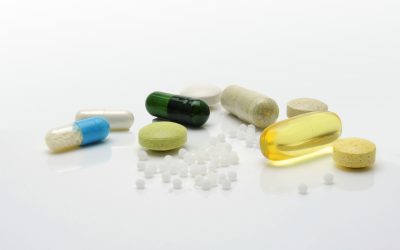Herbs and Supplements to Support Implantation
Implantation is the process in which a fertilized embryo implants into the lining of the uterus. This occurs around 7-10 days after ovulation. It is crucial for the growth of the placenta, fetus and amniotic sac. Good quality embryos, a receptive uterine lining and a balanced immune system increase the chances of successful implantation.
Implantation is less likely to occur in the presence of inflammation, autoimmune conditions and clotting disorders such as antiphospholipid syndrome. Endometriosis, fibroids, male factor sperm abnormalities, infections, thyroid imbalance and hormonal conditions also affect implantation success. However, many people who do not experience these conditions can still be at risk for implantation failure. In fact, only 25% of fertilized eggs proceed to a live birth and around 50% fail at implantation1. Therefore, it is important to increase uterine receptivity and calm the environment to optimize the chances of a successful implantation.
Herbs used to improve implantation
Fertility clinics offer options such as intralipids, intravenous immunoglobulin (IVIG) injections, prednisone, aspirin and fragmin to address complications associated with failed implantation or recurrent miscarriages. However, these therapies can come with significant costs and potential side effects.
Herbs can be a supportive adjunct or addition to these protocols. They are beneficial when used leading up to an assisted cycle or IVF procedure. The following herbs may be beneficial to prepare to uterus for implantation and prevent miscarriage.
Crampbark (Viburnum opulus)
This herb is anti-spasmodic and anti-inflammatory, which helps to reduce muscle spasms of the uterus. Crampbark has been used for hundreds of years to calm the uterus and prevent miscarriages. It is also beneficial in cases of dysmenorrhea, or painful periods.
Crampbark is a ‘partus preparator’. It helps to prepare the reproductive tract for labour by toning the uterus and minimizing cramping. This supports effective contractions, but does not stimulate them before labor is due.
Crampbark increases blood flow to the uterine lining which nourishes the embryo for a successful pregnancy. Toning the uterus can also prevent miscarriages by reducing uncoordinated contractions and persistent cramping. Tinctures including cramp bark, black haw (Viburnum prunifolium) and wild yam (Dioscorea villosa) are helpful to reduce cramping and prevent miscarriage2.
Black Haw (Viburnum prunifolium)
Similar to crampbark, black haw is a uterine sedative and anti-spasmodic specific to the uterus. It is often used to reduce menstrual cramps and uterine congestion.
Black haw has been used reliably in cases of recurrent miscarriages. For prevention, it is started early in pregnancy and continued until after the week of gestation when past miscarriage has occurred. The duration will vary depending on the individual2. Black haw can also help with anxiety and nervous tension, which is often present when trying to conceive or going through a cycle of assisted reproduction such as IVF. Black haw is beneficial to prepare the uterus for conception and is safe in pregnancy. Caution use if kidney stones are present.
Partridge Berry (Mitchella repens)
Partridge berry is used in cases of recurrent miscarriages, and to support labor and post-delivery healing. Because this herb is a uterine tonic and parturient, it is beneficial to strengthen the uterus and ensure a smooth and safe birth.
A combination of partridge berry, black haw, crampbark and chaste berry is indicated for threatened or recurrent miscarriages2. Partridge berry has been used safely in pregnancy by midwives and in Native American traditions with no adverse effects to the mother or fetus. There are no reported cases of toxicity
Combination Tincture
Crampbark, black haw and partridge berry are often used together in tincture form when planning to conceive or before going through an IVF transfer. This combination helps to support a healthy uterine lining, decrease muscle spasms and encouraging uterine blood flow. This formula can prevent miscarriage by calming the uterus, increasing receptivity to the embryo and decreasing cramping and inflammation. Under the care of an ND or midwife that is familiar with these herbs, this combination may be recommended leading up to conception or embryo transfer. It can also be used in the first few weeks pregnancy if there is a history of recurrent miscarriages.
Because medical doctors and fertility clinics are not familiar with these herbs, they will often tell patients to discontinue use. However, this formula is safe and effective for priming the uterus for implantation. If this formula has been prescribed to you, and you have questions or concerns please contact the prescribing doctor.
Other therapies that help to support implantation
N-acetyl cysteine (NAC)
NAC is an antioxidant that has a positive impact on endometrial thickness. It improves insulin resistance and ovulation in PCOS patients, and reduces oxidative stress. When oxidative stress is present in cells of the uterine lining, implantation rates are lower. Therefore, antioxidant therapies such as NAC can be beneficial in supporting ovulation and overall fertility3.
Red raspberry leaf (Rubus idaeus)
Red raspberry leaf is one of the most common herbs used in pregnancy. It strengthens and tones the uterus, which can help to support effective contractions and shorten the duration of labour. Red raspberry leaf is safe in pregnancy, and can be used from the first trimester to third trimester. Because of its effects as a uterine tonic, this herb may also be beneficial for preparing the uterus for implantation.
Vitamin D
Vitamin D is used by every cell in the body. It is crucial for many processes, including regulating hormones and immune function. Vitamin D deficiency is common in autoimmune conditions such as Hashimoto’s thyroiditis and antiphospholipid syndrome. Both of these conditions are associated with an increased risk of miscarriage.
Vitamin D improves uterine blood flow and endometrial thickness. Receptors are found in the uterine lining which help the immune system to accept the embryo during implantation. One study found that every one point increase in serum vitamin D resulted in a 1% decrease in miscarriage rates4. Therefore, optimizing vitamin D levels is very important to support implantation and reduce the risk of miscarriage in all patients.
Are you seeking fertility support?
There are various therapies that can be helpful in supporting implantation and reducing miscarriage risk. However, it is important to get a full workup through a naturopathic doctor, medical doctor and/or a fertility clinic. This can help determine potential underlying causes and contributing factors associated with fertility challenges. When it comes to natural therapies, the dosage and duration of use matters. It is important to talk to a healthcare practitioner for individualized support and to ensure safety of all herbs and supplements recommended. At Awaken Life, I focus on fertility care and wellness. I am here to support you along your journey and answer any questions you may have.
With love and in health,
Priya
References
- Timeva T, Shterev A, Kyurkchiev S. Recurrent implantation failure: the role of the endometrium. J Reprod Infertil. 2014;15(4):173–183.
- Romm, A., MD. (2010). Botanical Medicine for Women’s Health. St. Louis, MO: Churchill Livingstone
- Estany, S., Palacio, J., Barnadas, R., Sabes, M., Iborra, A., & Martínez, P. (2007). Antioxidant activity of N-acetylcysteine, flavonoids and α-tocopherol on endometrial cells in culture. Journal of Reproductive Immunology, 75(1), 1-10
- Bärebring L, Bullarbo M, Glantz A, et al. Trajectory of vitamin D status during pregnancy in relation to neonatal birth size and fetal survival: a prospective cohort study. BMC Pregnancy Childbirth. 2018;18(1):51. Published 2018 Feb 13. doi:10.1186/s12884-018-1683-7
I want to help you get there. The key to your fertility lies within you.
Let's Awaken it!
More Reading
Naturopathic Medicine in Fertility
Whether you are just starting to try to get pregnant, struggling with getting pregnant or suffering from recurrent miscarriages, a fertility naturopathic doctor can help you along your fertility journey. Naturopathic doctors are trained healthcare professionals with...
The Role of Melatonin in Fertility
Most of us have heard about melatonin in the context of sleep, as a supplement that can impact our circadian rhythm. However, this hormone also plays an important role in female fertility. What is Melatonin? Melatonin is a hormone made by the pineal gland in...
Simple Tips to Improve Your Chances of Conceiving
It’s easy to get caught up in the minor details of what we could be doing better when trying to get pregnant. This can lead to constant thoughts around the effects that our daily activities have on our chances. This self-criticism can feel overwhelming and...




Share This
Share this post with your friends!